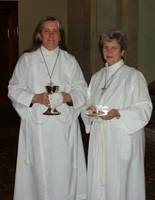
|
|
Liturgical Abuse of the Week
"The lay Christian faithful called to give assistance at liturgical celebrations should be well instructed and must be those whose Christian life, morals and fidelity to the Church's Magisterium recommend them. It is fitting that such a one should have received a liturgical formation in accordance with his or her age, condition, state of life, and religious culture. No one should be selected whose designation could cause consternation for the faithful" (46). These required expectations of so-called 'lay ecclesial ministers' Of greater import than RS, perhaps, is the document which is footnoted in the last sentence, a 1973 Instruction from the Sacred Congregation of the Sacraments entitled Immensae Caritatis: On Facilitating Reception Of Communion In Certain Circumstances. This document, significant for its time, seems to have been the first concrete provision for extraordinary ministers of the Holy Eucharist; hence, it lays out the norms requisite for the appointment of laypersons for this task. The pivotal declaration to this end is set forth as follows: "Local Ordinaries possess the faculty enabling them to permit fit persons, each chosen by name as a special minister, in a given instance or for a set period or even permanently, to give communion to themselves and others of the faithful and to carry it to the sick residing at home." A little further down, the term 'fit' is clarified: "The faithful who are special ministers of communion must be persons whose good qualities of Christian life, faith, and morals recommend them. Let them strive to be worthy of this great office, foster their own devotion to the eucharist, and show an example to the rest of the faithful by their own devotion and reverence toward the most august sacrament of the altar. No one is to be chosen whose appointment the faithful might find disquieting." Bishop Vasa's Affirmation of Faith, then, seems not only in accordance with the liturgical norms of our tradition; even more, it seems to be one of the more effective means of upholding and protecting these norms. Without regarding it as the 'normative' means of carrying them out (one would hope this wouldn't be necessary), it certainly ought to be considered a 'viable' means, and one wonders why it isn't yet (to my knowledge, at least) being imitated.
"Such persons can become a 'cause of stumbling' and if a Pastor or Bishop fails to act to correct the 'false teaching' then he too incurs the Lord's condemnation as a 'cause of stumbling' . . . . As I have reflected and prayed about [the failure of bishops to protect children from sexual abuse] for the past year I have become increasing convinced that there may be another much more subtle form of episcopal negligence which also has the potential to harm children, not only emotionally and physically, but primarily spiritually . . . I am convinced that causing the little ones to stumble could also apply when those commissioned by the Church to be witnesses to and examples for them give witness to values or beliefs incompatible with the authentic teachings of the Church." # posted by Jamie : 1:09 PM |
|
 In April Bishop Robert F. Vasa of
In April Bishop Robert F. Vasa of 





